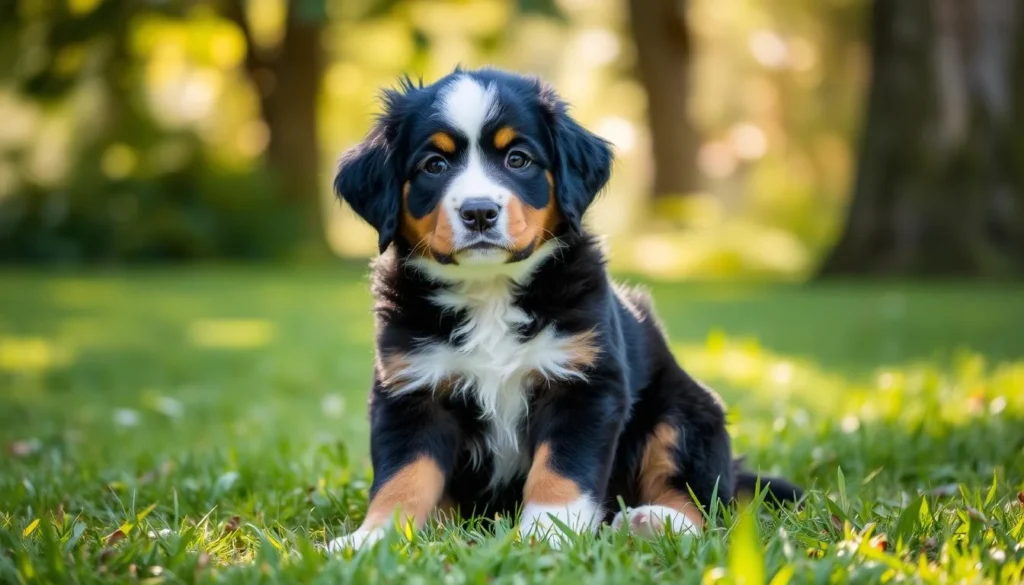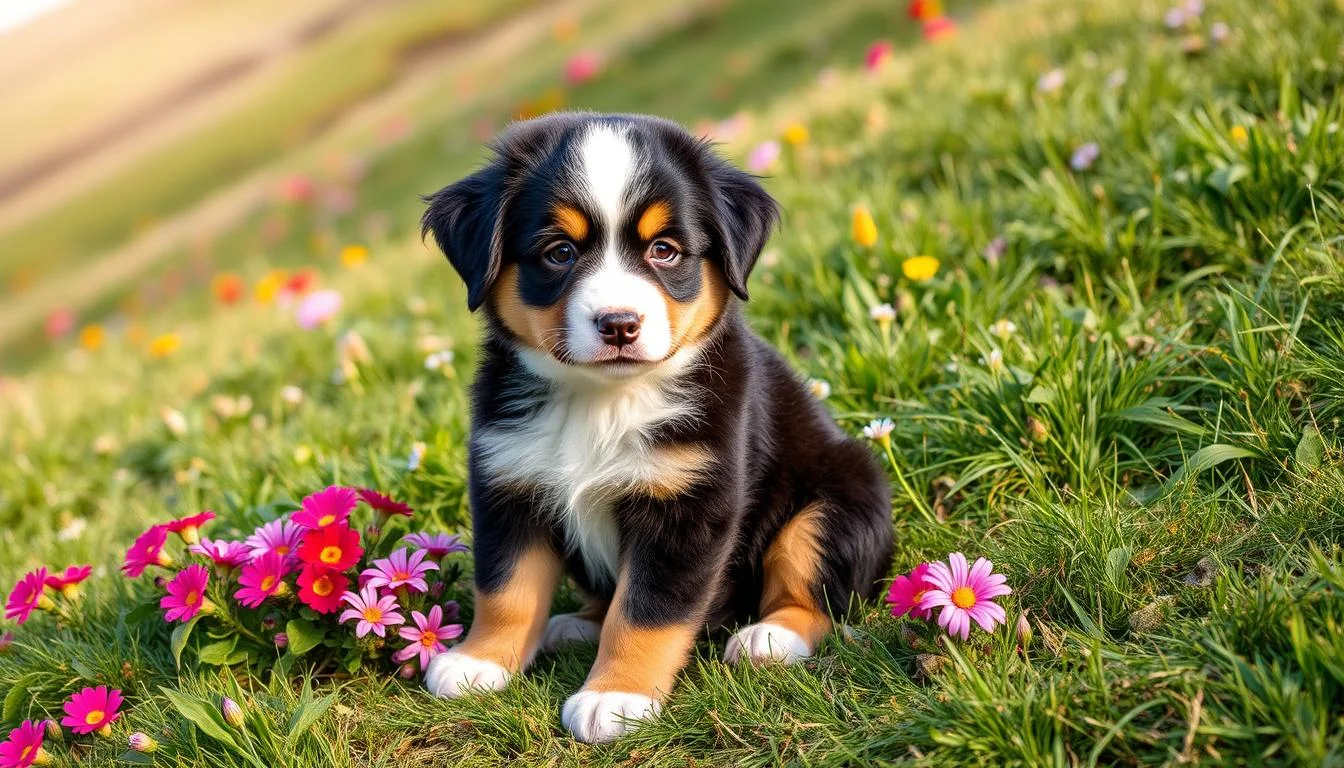Table of Contents
Imagine bringing home a fluffy bundle of joy. A Bernese Mountain Dog puppy will change your life with love and energy. These puppies are more than pets; they’re loyal friends ready to join your family.
These dogs have a rich Swiss heritage and a heart of gold. They will capture your soul from the start. Raising a Bernese Mountain Dog puppy is an adventure with unique challenges and rewards.
From their striking tri-colored coat to their gentle nature, these dogs are family members. They need dedicated care, understanding, and commitment. This guide will help you care for your Bernese Mountain Dog puppy.
Key Takeaways
- Bernese Mountain Dogs are large breed puppies with a rich Swiss working heritage
- Proper care and nutrition are key for healthy development
- They need a lot of space and moderate exercise
- Early socialization is vital for a well-adjusted companion
- Expect a big investment in time, love, and resources
- Their lifespan is short but filled with intense loyalty
Understanding the Bernese Mountain Dog Heritage
The Sennenhund breed is a legacy of Swiss working dogs. The Bernese Mountain Dog is a key part of this history. They come from the Swiss Alps, known for their loyalty and versatility.

Origins in Switzerland
These dogs have a history of over 2,000 years. They followed Roman invaders through Switzerland’s mountains. Their strength and work ethic were essential for farmers and traders.
- Originated in the Swiss canton of Bern
- Developed alongside Roman agricultural communities
- Recognized by Swiss Kennel Club in 1907
- Officially acknowledged by American Kennel Club in 1937
Historical Working Roles
Bernese Mountain Dogs were more than just pets. They helped in many ways. Their main jobs were:
- Herding cattle in the mountains
- Pulling heavy farm carts
- Protecting as watchdogs
- Helping with farm work
Breed Development Timeline
| Period | Developmental Milestone |
|---|---|
| 2000+ years ago | Initial breed emergence with Roman settlers |
| 19th Century | Formalization of breed characteristics |
| 1907 | Swiss Kennel Club official recognition |
| 1937 | American Kennel Club breed registration |
“The Bernese Mountain Dog embodies the spirit of Swiss agricultural tradition – strong, reliable, and deeply connected to its working roots.”
Knowing their history helps us see why Bernese Mountain Dogs are great companions. They are hardworking and loving, making them perfect family pets.
Physical Characteristics and Growth Stages

Bernese Mountain Dogs are amazing gentle giants. They have a stunning look and a strong build. Their tri-color coat makes them stand out. Knowing how they grow is key to caring for them well.
They have impressive features like:
- Muscular and sturdy body structure
- Thick, luxurious double coat
- Expressive dark eyes
- Distinctive black, white, and rust-colored fur pattern
Here’s how they grow:
- Puppy Stage (0-6 months): Fast growth and development
- Adolescent Stage (6-18 months): Keeps getting bigger and stronger
- Adult Stage (18-24 months): Reaches full size and strength
| Gender | Weight Range | Height Range |
|---|---|---|
| Male | 80-115 lbs | 25-27.5 inches |
| Female | 70-95 lbs | 23-26 inches |
“The Bernese Mountain Dog grows not just in size, but in character and companionship.” – Breed Experts
Watching your Bernese Mountain Dog grow means regular vet visits. Proper diet and exercise are key for their bones and muscles to grow right.
Bernese Mountain Dog Puppy Development Timeline
Tracking your large breed puppy’s growth is key to knowing their milestones. The Bernese Mountain Dog goes through big changes in its early months. Each stage brings its own challenges and chances for raising a friendly dog.
Puppies change a lot in their first few months. These changes shape their future personality and skills.
Neonatal Period (0-2 weeks)
In the first two weeks, Bernese Mountain Dog puppies rely fully on their mom. They have:
- Can’t control their body temperature
- Have closed eyes and ears
- Move very little
- Need their mom for everything
Transitional Period (2-4 weeks)
This phase is full of big changes for your puppy:
- Starts to open eyes and ears
- First tries at walking
- Starts to interact with siblings
- Starts to bark and wag its tail
Socialization Period (3-12 weeks)
This is the most important time for learning and growing:
| Age Range | Key Developmental Milestones |
|---|---|
| 4-8 weeks | Learning basic social skills |
| 8-12 weeks | Critical socialization period |
| 12 weeks | Becoming more independent |
Adolescence and Maturity
Your Bernese Mountain Dog keeps growing through adolescence. Emotional maturity usually comes between 12-18 months. Expect more energy, boundary testing, and growth during this time.
“Understanding each developmental stage helps create a strong, confident, and well-adjusted family companion.”
Remember, consistent training, proper nutrition, and patient socialization are key to raising a healthy, well-adjusted Bernese Mountain Dog puppy.
Essential Healthcare and Vaccination Schedule
Keeping your large breed puppy healthy is key. Bernese Mountain Dogs, being strong and furry, need a special care plan. This plan should meet their unique needs as they grow.
Vets say vaccinations are vital to stop serious dog diseases. About 95% of vets agree that timely shots are key to keeping puppies healthy.
“Prevention is always better than cure, specially for large breed puppies with complex health considerations.”
Recommended Vaccination Timeline
- 6-8 weeks: First round of core vaccines
- 10-12 weeks: Follow-up booster shots
- 14-16 weeks: Final puppy vaccination series
Vaccination Approach
| Vaccine Type | Recommended Age | Frequency |
|---|---|---|
| Distemper | 8-12 weeks | Every 3-4 weeks |
| Parvovirus | 6-16 weeks | Multiple doses |
| Rabies | 12-16 weeks | Annual/State requirements |
Titer testing can reduce unnecessary vaccinations by up to 50%. This lets you tailor your puppy’s care. Talk to your vet to create a plan that fits your puppy’s needs.
Regular vet visits are important. They help keep an eye on your Bernese Mountain Dog’s health. By focusing on preventive care, you help your puppy stay healthy and grow well.
Nutritional Requirements for Healthy Growth
Raising a Bernese Mountain Dog puppy needs careful attention to nutrition. These large breed puppies have special dietary needs. Proper nutrition is key for their growth and health.
Nutrition is vital for your puppy’s health and growth. Knowing the right nutrients helps avoid growth problems. It also supports their physical development.
Puppy-Specific Diet Guidelines
Your Bernese Mountain Dog puppy needs a diet made for large breed puppies. Important nutrients include:
- High-quality protein for muscle development
- Controlled calcium and phosphorus levels
- Balanced energy sources
- Essential vitamins and minerals
Feeding Schedule and Portions
Feeding schedules are key for these gentle giants. Here’s a suggested plan:
- 6-12 weeks: 4 meals daily
- 3-6 months: 3 meals daily
- 6-12 months: 2 meals daily
“Nutrition is the foundation of your puppy’s health and future well-being.”
Dietary Supplements and Considerations
While a balanced diet is essential, some puppies might need supplements. Talk to your vet about joint health support and nutritional boosters for your Bernese Mountain Dog.
Remember, each puppy is unique. Watch your dog’s weight, adjust portions as needed, and always choose high-quality, breed-specific nutrition.
Training and Socialization Fundamentals
Training a Bernese Mountain Dog needs patience, consistency, and knowing their unique personality. These dogs are great with families and do well with positive training and obedience. The first 12 weeks are key for their social and behavioral development.
“The first 120 hours of training are critical for basic behavior and lifestyle skills.”
Your Bernese Mountain Dog puppy will need a good training plan. It should cover basic commands, house training, socialization, and positive reinforcement.
- Basic command mastery
- House training techniques
- Socialization strategies
- Positive reinforcement methods
Make training fun and structured. Spend about 30 minutes a day. This helps build a strong bond and teaches important skills.
| Training Program | Hours | Price |
|---|---|---|
| Basic Behavior | 120 | $5,750 |
| Advanced Behavior | 240 | $6,750 |
| Comprehensive Training | 320 | $7,750 |
Socialization is also vital for your Bernese Mountain Dog. Start with one-on-one play and then introduce them to different places. Avoid dog parks until your puppy is at least 6 months old to prevent overwhelming or potentially traumatic interactions.
By sticking to these training basics, you’ll create a well-behaved, confident, and loving family pet.
Exercise Guidelines and Activity Levels
Raising a Bernese Mountain Dog needs careful attention to their exercise needs. These gentle giants need a balanced approach to physical activity. This supports their healthy development and prevents joint and bone issues.
Understanding the right exercise routine is key for these large breed puppies. Their outdoor adventures should match their growing bodies and energy levels.
Age-Appropriate Exercise Plans
Veterinary research gives specific guidelines for puppy exercise. Here’s a breakdown of recommended activity levels:
- Puppies can walk approximately 5 minutes multiplied by their age in months
- Limit leash training to 5-10 minutes per session
- Wait at least 1 hour after feeding before walking
Physical Activity Limitations
Bernese Mountain Dogs need special care during their growth stages. Excessive vigorous exercise can increase the risk of musculoskeletal malformations. Large breed puppies should avoid hard surfaces and intense activities until fully developed.
“Puppies given the opportunity to run freely can self-regulate their activity levels, reducing risks of over-exertion.” – Veterinary Experts
Mental Stimulation Needs
These intelligent gentle giants need more than just physical exercise. Interactive games like hide-and-seek, puzzle toys, and training sessions are essential for their mental development.
- Recommended daily exercise: About 1 hour
- Suggested activities:
- Short walks
- Gentle play sessions
- Brain games
By following these guidelines, you’ll ensure your Bernese Mountain Dog puppy grows into a healthy, well-balanced adult companion. They’ll be ready for future outdoor adventures.
Creating the Ideal Living Environment
Bringing a Bernese Mountain Dog home needs careful planning. They must feel safe and comfortable. These large dogs need lots of space and the right setup to be happy.
Space is key for these big dogs. Experts say they need 600-800 square feet to move around easily. Your Bernese Mountain Dog will enjoy:
- A special indoor spot to rest
- Shaded areas to stay cool
- Bedding that supports their big body
- Protection from very hot or cold temperatures
Keeping the temperature right is important. Their thick coat can make them hot in warm weather. Make cool spots with:
- Tile or hardwood floors
- Fans or air conditioning
- Always having fresh water
- Limiting time outside in the middle of the day
“A well-designed home environment is the foundation of a happy, healthy Bernese Mountain Dog.” – Veterinary Canine Specialists
Think about your home’s layout. These dogs need to be part of the family. Place their bed in a spot where they can see what’s going on without feeling left out.
Remember, your Bernese Mountain Dog is more than a pet. They’re a family member who needs a loving, comfortable home.
Grooming and Coat Care Requirements
Caring for your Bernese Mountain Dog’s coat is a big job. They have a beautiful double coat that needs regular care. This keeps them looking and feeling great.
It’s important to know what grooming your dog needs. Bernese Mountain Dogs have a thick, medium-length double coat. They need consistent care to stay healthy and look good.
Essential Brushing Techniques
Brushing is key for these dogs. Here are some important techniques to keep their coat in great shape:
- Brush 3-4 times per week using a pin and bristle brush
- Focus on tough spots like neck sides and behind ears
- Use a slicker brush to get rid of loose undercoat
- Start brushing early to make it a positive experience
Bathing and Coat Maintenance
Keep a regular bathing schedule for your Bernese Mountain Dog. This keeps them clean and healthy:
| Frequency | Recommendation |
|---|---|
| Regular Baths | Every 6-8 weeks |
| Shedding Season | More frequent brushing (daily) |
| Bathing Products | Pet-specific, gentle shampoos |
Seasonal Coat Changes
Your Bernese Mountain Dog’s coat changes a lot throughout the year. In shedding seasons, they lose more hair and need more grooming. Get ready for heavy shedding by brushing more often and using the right tools.
“Regular grooming is not just about appearance, it’s about maintaining your dog’s overall health and strengthening your bond.” – Veterinary Grooming Expert
Don’t forget about nail trimming, ear cleaning, and dental care. Spending time on these grooming tasks keeps your dog healthy, comfortable, and looking amazing.
Common Health Concerns and Prevention
As owners of these gentle giants, it’s key to know about health challenges. Bernese Mountain Dogs are loved for their friendly nature. But, they face health issues that need early action.
These dogs are at risk for certain health problems because of their genes. About 28% of Bernese Mountain Dogs get hip dysplasia. This can really affect their movement and life quality.
- Hip and Elbow Dysplasia: Watch for signs of limping or difficulty moving
- Cancer: Leading cause of mortality in the breed
- Heart Disease: Particularily dilated cardiomyopathy
- Bloat: A potentially fatal condition in deep-chested breeds
Early detection is key to managing these health challenges. Regular vet visits and genetic tests can spot risks early. Watching for small changes in behavior and activity is also important.
“Prevention is always better than cure when caring for these magnificent gentle giants.”
Nutrition is key in preventing health issues. A balanced diet for large breed puppies can help avoid joint problems. Also, watch their weight to avoid obesity, which can make health issues worse.
Bernese Mountain Dogs usually live 6-8 years. So, it’s vital to manage their health well. By staying informed and careful, you can help your dog live a happy life.
Building Strong Family Bonds
Bernese Mountain Dogs are amazing family pets. They bring warmth and loyalty to any home. These dogs become loved family members quickly. Your bond with them is more than just pet ownership; it’s a deep connection.
To build a strong bond, you need to put in effort and understand each other. Here are some ways to strengthen your connection:
- Engage in daily interactive play sessions
- Involve all family members in training and care
- Create predictable routines that build trust
- Practice positive reinforcement techniques
“A dog is the only thing on earth that loves you more than he loves himself.” – Josh Billings
Studies show that spending quality time with pets improves your bond. For Bernese Mountain Dogs, this means:
- Spending 30-60 minutes daily in direct interaction
- Using treats as positive reinforcement
- Creating consistent training routines
- Providing mental and physical stimulation
It’s important to know your dog’s personality. About 75% of dogs have specific play preferences. Find what connects you through cuddles, outdoor adventures, and training.
Being patient and showing consistent love turns your Bernese Mountain Dog into a true family member. Your dedication will be repaid with loyalty and companionship.
Conclusion
Starting a journey with a Bernese Mountain Dog puppy is an amazing adventure. These dogs bring joy to families who care for them. With a life span of 7-10 years, every moment with your puppy is special.
Training and socializing your puppy is key. Positive training, daily walks, and consistent care make them loyal. Remember, these dogs need regular grooming and early socialization to be happy at home.
As your puppy grows, you’ll see a big change. They become patient and loving family members. Following this guide helps you build a strong, loving bond with your dog.
Having a Bernese Mountain Dog puppy is more than just owning a pet. It’s about creating a lifelong friendship with a loving dog. Enjoy every moment and cherish the bond you’ll form.
